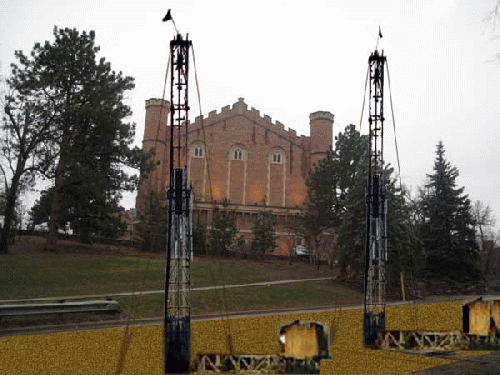Fracking Mackey by j dial (photo credit)
This article emerged
from the seventh of nine planned lectures held by the Center of the American
West, CU Continuing Education, Boulder County, and the AirWaterGas Research
Network (of the National Science Foundation/Sustainability Research Network) on
various aspects of hydraulic fracturing.
Nick Flores[1] is an economist who knows the oil-and-gas
industry from the inside, having been in the merchant marines hauling platforms
and rigs to sundry locations in the Gulf.
Industry exposure didn't end there; he was in grad school six months
after the Exxon Valdez sullied the Arctic shore and studied first-hand the
economics of accidents. He was not
dismayed. In his words, "Shale gas is a
revolution. It has transformed energy in
America. What we're seeing now is but
the tip of the iceberg." He didn't say
from which dwindling sheet it might have been calved.
Yet Flores is not utterly enchanted by the industry. There is what he terms a problem of externalities, meaning that the full cost of the venture is not appreciated when such "routine" risks as methane leaks and pollution of ground or surface water, and "high-priority" risks such as cement, drill-casing, and wastewater-impoundment failures, are not factored into the economic analysis. Such externalities are often expensive and not easily addressed, and should be internalized to reflect real costs.
Having lived in San Francisco, which receives water from the Hetch Hetchy water system, a system so pristine it is one of the few for which the Environmental Protection Agency requires no filtration, Flores comprehends the preciousness of pure water. He wonders what will happen if in our zeal to poke the earth we should inadvertently pollute a major aquifer such as the Ogallala, which underlies eight states and once contained water equal in quantity to Lake Huron. (It too is dwindling.) If such an integral resource should be fouled by whatever means, what then? Part of the damage hits the pocketbook. In heavily fracked Washington County, Pennsylvania, property values have declined almost 25 percent in places overlying aquifers through which drillers cement their casings. Is it "right" that property values have declined, or is it just perception? The answer is unimportant; all that matters is perception's effect on the market.
Flores notes EPA's limp-wristed governance of greenhouse gases. Methane, the major component of natural gas, is utterly ignored. (Oh, there are voluntary programs.) EPA may have downsized its prior estimate of how much methane leaks from fracking wells, but that puts it at odds with NOAA's recent study. Who is right? In any case, geologists and EPA agree that, compared to conventional drilling, hydraulic fracturing leaks more methane. Fracking fluid is injected and then pumped out (or a percentage is), but it returns laden with natural gas and other disinterred volatile chemicals that if released foul the air around drill sites. An estimated 90 percent of this "burping" can be captured in a "green-completion" process that caps the well and separates the petrochemicals for later sale. Even though this is of economic benefit of drillers, however, it is by no means always done; old fields may lack technology while new fields may have neither pipelines nor storage facilities built, and meanwhile methane seeps away. As you may know, methane in the atmosphere is a serious contender in atmospheric warming. Atmospheric methane gradually converts to carbon dioxide so it is over the short term that it does its damage. In its first 20 years, methane's ability to capture heat in the atmosphere dwarfs that of carbon dioxide 70 times over.
Much like spent rods from nuclear plants and almost as dangerous, wastewater is a
facet of fracking often overlooked and underfunded. Current options include dumping it into
often-open holding pools, forcing it into injection wells, or recycling. Dumping it anywhere presents obvious problems
including, with injection wells, persuasive evidence of earthquakes. Recycling would be great, but it's not easy
to clean water laced with not
only heavy metals and radionuclides but dissolved salts, which require reverse
osmosis or other exotic means to treat.
(If desalinating salt water were easy, the world would have no
freshwater problem, at least not yet.)
Options for dealing with wastewater are under creative
review. Why not ship it away? (What do you mean there is no away?) Last March the Coast Guard "quietly" sent to
the White House a proposal
to put fracking wastewater on barges, said to be safer for transport than
trucks and trains. The toxic brew will
be shipped to someone else's back yard for disposal. Yucca Mountain anyone? Frio County,
Texas, which is not among the state's top gas producers but that nevertheless
has more disposal wells than the three top gas-producing counties combined, is
evaluating a penny-a-barrel fee on disposed wastewater. The compensation is expected to bring the
county over a million dollars a year, which would feed a fund to combat
environmental damage.
We have such faith in compensation. While it comforts the aggrieved and pains the
aggressor, that's often as far as it goes.
And the aggressor's pain may be tiny indeed. Caps on damages provide a well-trod path for
industry to escape real consequence for their sins. (Caps can zap citizens on the other cheek when they
limit damages for civil suits.) In the end, let us not forget that no amount of compensation will restore what is
irreplaceable.
Although groundwater property rights vary widely by state, they
generally emphasize
water quantity over contamination. Some
landowners may use as much groundwater as they wish without regard for impacts
anywhere else. This is called the
Absolute Dominion Rule, and it is codified in 11 states, including Texas. "Use" in this case would include, I suppose,
the right to pollute the groundwater. Colorado
and other western states have adopted a doctrine of Prior
Appropriation--the first landowner to "beneficially" use or divert water from
underground is given priority over later users.
Now many states have updated this doctrine with a permit system. Available permits are in hot pursuit; you can guess by whom.
When your well-water starts fizzing, fingering the culprit isn't
easy. Contaminants act differently
underground, like senators behind doors. How do you prove who polluted
the water, and when, and how? Equally
important, what is to be done? EPA says that much progress on cleaning
polluted aquifers has been made. Wells
can shlep contaminated water to the surface for treatment. This intensive technology works if
contaminants contain neither solvents nor oil and so long as the contamination
has not spread. Since fracking fluid and
wastewater are excluded and aquifers tend not to be contained, EPA's assertion
seems delusional.
Small producers lose their shirts in these times of low gas
prices, so one might wonder why they keep drilling. Two reasons. Leases may mandate that lessees use their
drilling rights or lose them. And prices
may be low now, but just wait. Prices for
natural gas in other areas--Japan, Europe--are much higher. It costs to convert gas to liquefied natural
gas for long-distance transport, but producers have their eyes on the prize and
preparations are being made. US prices
will then rise; it won't go the other way around.
It wasn't so long ago that energy prices were rising in the
face of looming energy scarcity. Very
quickly shale-gas production
has reversed that. In the first decade
of this century, US gas production went from almost none to more than 10
billion cubic feet per day. In 2012,
shale gas was 50 percent of the gas market; by 2035, Flores says, the
percentage should swell to three-quarters.
If oil imports diminish and "petro dollars" remain in the US, the dollar
should be fortified and economic growth fueled by this bonanza. That is, to the extent that the bonanza
remains both at low prices and here. And
to the extent that climate change does not rudely intervene.
Natural gas may burn cleanly but it remains a fossil
fuel. Our dependence on fossil fuels is
irrevocably changing our world while we tend to our piquant concerns. Even if less is escaping at wellheads, incalculable
amounts of methane now erupt from thawing Arctic tundra and waters. Will depleting a new fossil fuel will be our
salvation?
Past articles from
this series:
(Note: You can view every article as one long page if you sign up as an Advocate Member, or higher).






